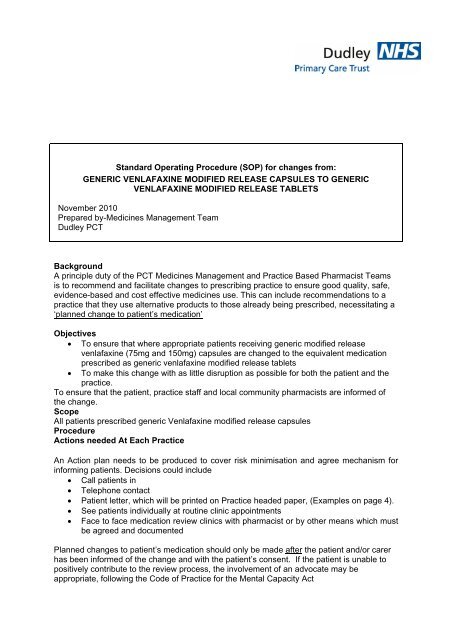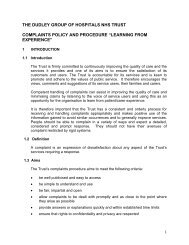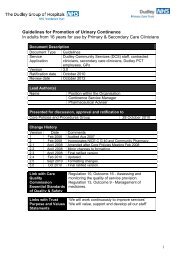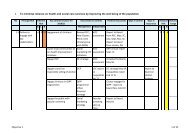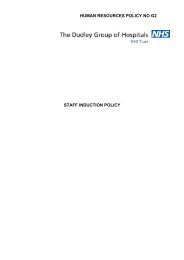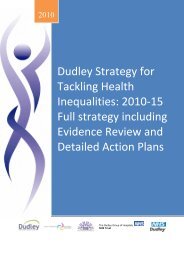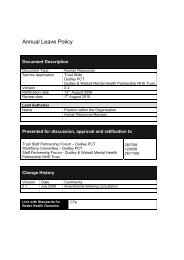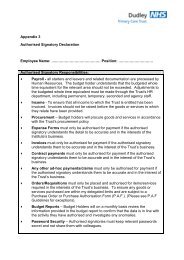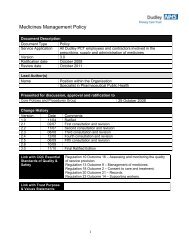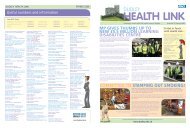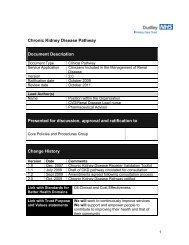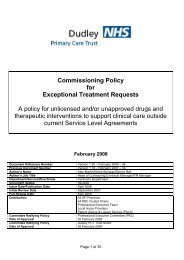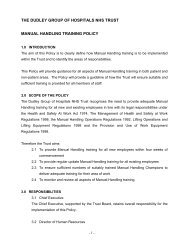Standard Operating Procedure (SOP) for changes from: GENERIC ...
Standard Operating Procedure (SOP) for changes from: GENERIC ...
Standard Operating Procedure (SOP) for changes from: GENERIC ...
Create successful ePaper yourself
Turn your PDF publications into a flip-book with our unique Google optimized e-Paper software.
<strong>Standard</strong> <strong>Operating</strong> <strong>Procedure</strong> (<strong>SOP</strong>) <strong>for</strong> <strong>changes</strong> <strong>from</strong>:<br />
<strong>GENERIC</strong> VENLAFAXINE MODIFIED RELEASE CAPSULES TO <strong>GENERIC</strong><br />
VENLAFAXINE MODIFIED RELEASE TABLETS<br />
November 2010<br />
Prepared by-Medicines Management Team<br />
Dudley PCT<br />
Background<br />
A principle duty of the PCT Medicines Management and Practice Based Pharmacist Teams<br />
is to recommend and facilitate <strong>changes</strong> to prescribing practice to ensure good quality, safe,<br />
evidence-based and cost effective medicines use. This can include recommendations to a<br />
practice that they use alternative products to those already being prescribed, necessitating a<br />
‘planned change to patient’s medication’<br />
Objectives<br />
• To ensure that where appropriate patients receiving generic modified release<br />
venlafaxine (75mg and 150mg) capsules are changed to the equivalent medication<br />
prescribed as generic venlafaxine modified release tablets<br />
• To make this change with as little disruption as possible <strong>for</strong> both the patient and the<br />
practice.<br />
To ensure that the patient, practice staff and local community pharmacists are in<strong>for</strong>med of<br />
the change.<br />
Scope<br />
All patients prescribed generic Venlafaxine modified release capsules<br />
<strong>Procedure</strong><br />
Actions needed At Each Practice<br />
An Action plan needs to be produced to cover risk minimisation and agree mechanism <strong>for</strong><br />
in<strong>for</strong>ming patients. Decisions could include<br />
• Call patients in<br />
• Telephone contact<br />
• Patient letter, which will be printed on Practice headed paper, (Examples on page 4).<br />
• See patients individually at routine clinic appointments<br />
• Face to face medication review clinics with pharmacist or by other means which must<br />
be agreed and documented<br />
Planned <strong>changes</strong> to patient’s medication should only be made after the patient and/or carer<br />
has been in<strong>for</strong>med of the change and with the patient’s consent. If the patient is unable to<br />
positively contribute to the review process, the involvement of an advocate may be<br />
appropriate, following the Code of Practice <strong>for</strong> the Mental Capacity Act
Preparation and Agreement of Practice<br />
• A GP partner to agree to planned change to patient’s medication and sign ‘Practice<br />
Agreement’ Form. Same GP partner takes responsibility <strong>for</strong> discussing and agreeing<br />
proposed planned change to medicines with other GPs in practice.<br />
• Responsible pharmacist ensures all GPs in practice have been in<strong>for</strong>med of proposed<br />
planned change to patient’s medication and communicates in agreed practice<br />
manner.<br />
• Template letter prepared by PCT Medicines Management Team to in<strong>for</strong>m patients of<br />
the planned change to their medicines. Letter must explain reason <strong>for</strong> planned<br />
change to medicines, detail exactly how prescription has changed, contact details in<br />
case of query and how and when they should obtain new prescription.<br />
• Capacity to see patients face to face in a clinic to be assessed<br />
• GP agreeing planned change to patient’s medication to approve method of in<strong>for</strong>ming<br />
patients, either at routine clinic appointments, at face to face medication review clinics<br />
with pharmacist or by proposed patient letter, which will be printed on Practice<br />
headed paper, or by other agreed and documented means. Lead GP should see,<br />
approve and sign the ‘template letter’ <strong>for</strong> use in practice. Example attached on page<br />
4.<br />
• Any patients that practice wants excluded <strong>from</strong> the planned change to patient’s<br />
medication should be agreed now.<br />
• Agree a date <strong>for</strong> planned change to patient’s medication to start<br />
• Agree who in the practice will in<strong>for</strong>m patients and/or send letters.<br />
In<strong>for</strong>ming the Community Pharmacists<br />
• Two weeks prior to the planned change to medicines commencing, the PCT<br />
Medicines Management Team should in<strong>for</strong>m local community pharmacies. Visits or<br />
telephone contact by Practice Based Pharmacist are also recommended.<br />
Undertaking the planned change to medicines<br />
• Run a report <strong>from</strong> the practice computer of all patients with a current active repeat of<br />
the drug to be changed.<br />
• Ensure that no patient on the list has died or recently moved away. (Check with<br />
Practice staff)<br />
• Systematically work through the patient list. Delete any patient that doesn’t fit specific<br />
change criteria. Agree list with GPs and decide on most appropriate method to<br />
communicate with individual patients.<br />
• Undertake planned change to patient’s medication of all suitable patients. Amend the<br />
patient’s computer prescription record to the new drug and discontinue old drug,<br />
recording reason <strong>for</strong> change. Authorise agreed number of repeats and READ code<br />
entry in patient’s history detailing change and any monitoring requirements.<br />
• Communicate planned change to patient’s medication to patients<br />
• Provide list of patients changed to GPs and reception staff to help deal with any<br />
queries.<br />
• Refer to Repeat Dispensing Protocol <strong>for</strong> communicating <strong>changes</strong> to patients that are<br />
part of this scheme<br />
Monitoring<br />
• Arrange and maintain any follow up monitoring<br />
Confidentiality<br />
Patient in<strong>for</strong>mation used and seen shall be treated in the strictest confidence and not be<br />
divulged to any third party without the express permission of the Practice.<br />
PBPs should not take any patient identifiable data <strong>from</strong> the practice premises at any time.<br />
Work taken outside the practice should be anonymised<br />
Patient level data e.g. patient interventions, submitted to the PCT should also be<br />
anonymised.<br />
PBPs should agree a safe haven <strong>for</strong> storage of work within the practice.<br />
The unauthorized use or disclosure of patient or other personal in<strong>for</strong>mation is a disciplinary
matter liable to the contract being terminated <strong>for</strong>thwith.<br />
Dudley PCT – Medicines Management Team<br />
Practice Planned Change To Medicines Agreement Form<br />
Practice<br />
I agree that the planned change to medicines outlined below should go ahead according to<br />
the PCT <strong>Standard</strong> <strong>Operating</strong> <strong>Procedure</strong> and Drug Specific Protocol. I have in<strong>for</strong>med all other<br />
GPs and relevant staff working at the practice, and have approved the proposed planned<br />
change to medicines letter and additional methods of communication with patients.<br />
Signed___________________________________________Date__________________<br />
Name__________________________________________________________________<br />
Current Product<br />
Replacement Product<br />
Original dose & frequency<br />
New product dose and frequency
Appendix 1<br />
Practice Heading<br />
SAMPLE LETTER 1<br />
Date<br />
Dear<br />
Following a review of your medication there has been a change to the <strong>for</strong>mulation of<br />
your venlafaxine. It will now be prescribed as TABLETS. There has been no change to<br />
the overall dose you take each day.<br />
This change is in line with local advice given to us by Walsall and Dudley Mental<br />
Health Trust which suggests the tablet <strong>for</strong>mulation should be used as the first line<br />
treatment option if venlafaxine is required.<br />
There has been no change to the actual medicine you receive, the only difference is<br />
that it is a tablet rather than a capsule. So there should be no change to the benefit<br />
you receive <strong>from</strong> your current treatment.<br />
You will notice that the tablet is much smaller than the capsule <strong>for</strong>mulation and<br />
there<strong>for</strong>e potentially easier to swallow.<br />
Your new prescription will read<br />
Venlafaxine _____ XL Tablets<br />
Take 1 daily<br />
We hope that you are happy with this change, if you have any queries please contact<br />
the practice.<br />
Please finish off your old supply of medication be<strong>for</strong>e starting your new one.<br />
Yours sincerely
Appendix 2<br />
Practice Heading<br />
SAMPLE LETTER 2<br />
Date<br />
Dear<br />
Following a review of your medication there has been a change to the <strong>for</strong>mulation of<br />
your venlafaxine. It will now be prescribed as TABLETS. There has been no change to<br />
the overall dose you take each day.<br />
This change is in line with local advice given to us by Walsall and Dudley Mental<br />
Health Trust which suggests the tablet <strong>for</strong>mulation should be used as the first line<br />
treatment option if venlafaxine is required.<br />
There has been no change to the actual medicine you receive, the only difference is<br />
that it is a tablet rather than a capsule. So there should be no change to the benefit<br />
you receive <strong>from</strong> your current treatment.<br />
You will notice that the tablet is much smaller than the capsule <strong>for</strong>mulation and<br />
there<strong>for</strong>e potentially easier to swallow<br />
The advantage of using these tablets is that they are available in a higher dose tablet<br />
which means you need to take fewer tablets each day.<br />
You are currently taking<br />
Venlafaxine 75mg MR Capsules<br />
Venlafaxine 150mg MR Capsules<br />
Take 1 daily<br />
Take 1 daily<br />
Your new prescription will read<br />
Venlafaxine 225mg XL Tablets<br />
Take 1 daily<br />
We hope that you are happy with this change, if you have any queries please contact<br />
the practice.<br />
Please finish off your old supply of medication be<strong>for</strong>e starting your new one.<br />
Yours sincerely
Appendix 3<br />
Sample Prescription Note to be attached to Repeat prescriptions.<br />
(Please note this not take into account dose <strong>changes</strong> when optimising to a higher strength of<br />
venlafaxine tablets)<br />
Dear Patient<br />
CHANGE TO YOUR VENLAFAXINE<br />
Following a review of your medication there has been a change to the <strong>for</strong>mulation of<br />
your venlafaxine. It will now be prescribed as TABLETS. There has been no change to<br />
the overall dose you take each day.<br />
There has been no change to the actual medicine you receive, the only difference is that<br />
it is a tablet rather than a capsule. So there should be no change to the benefit you<br />
receive <strong>from</strong> your current treatment.<br />
You will notice that the tablet is much smaller than the capsule <strong>for</strong>mulation and<br />
there<strong>for</strong>e potentially easier to swallow<br />
If you have any concerns about this change please contact the practice<br />
Practice details<br />
Page 6 of 6


